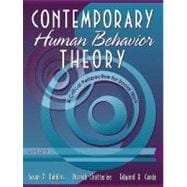
Contemporary Human Behavior Theory : A Critical Perspective for Social Work
- ISBN13: 9780205408160
- ISBN10: 0205408168
- Additional ISBN(s): 9780205055562, 9780205149209
- Edition: 2nd
- Format: Paperback
- Copyright: 2006-01-01
- Publisher: PRENTICE HALL
- View Upgraded Edition
-
Your order must be $35 or more to qualify for free economy shipping. Bulk sales, PO's, Marketplace items, eBooks and apparel do not qualify for this offer.








